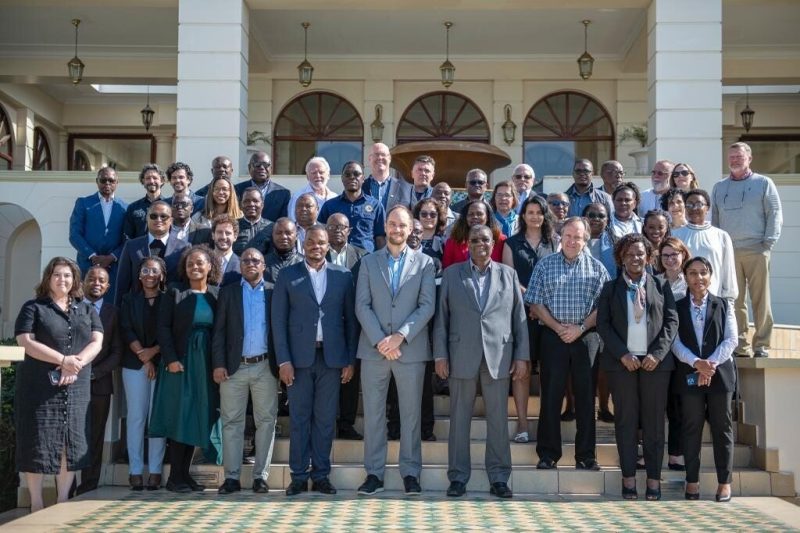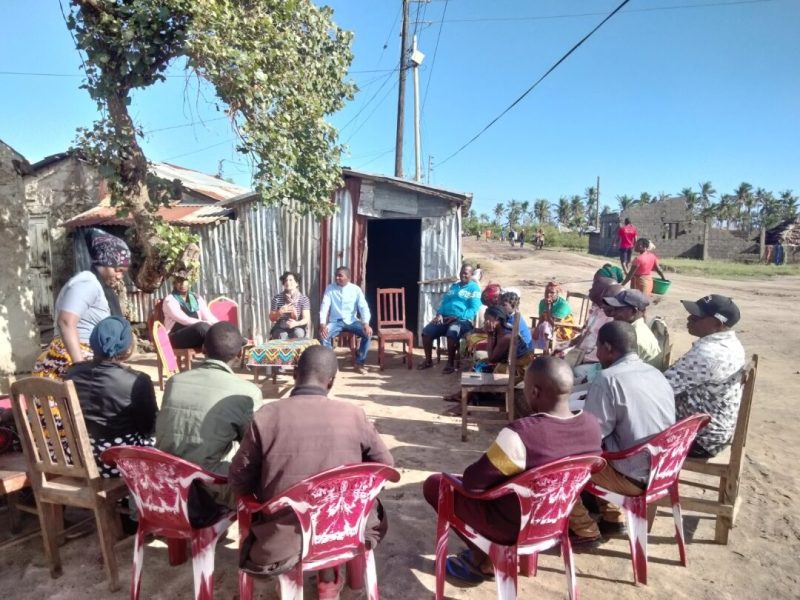
MCC staff and representatives from NGOs and the Government of Mozambique attend the Co-Creation Workshop for the Coastal Livelihoods and Climate Resilience (CLCR) Project in Maputo, Mozambique in mid-July.
Jessica Glickman
Mozambique is one of Africa’s most vulnerable countries to climate change. In recent years, the country has been exposed to an increase in the frequency and intensity of extreme weather events such as cyclones, storms, floods, and drought. According to the 2021 Global Climate Risk Index, Mozambique, Zimbabwe, and the Bahamas were the countries most affected by extreme weather events in 2019.
The country’s extensive coastline means that more than 60% of Mozambicans live in low-lying coastal areas, placing their livelihoods at risk to sea level rise, salt-water intrusion, storms, and floods. In addition, they rely heavily upon fish for basic food security and nutrition.
Recognizing the need to build Mozambique’s capacity to adapt to climate change and strengthen coastal livelihoods, the Millennium Challenge Corporation (MCC) Board approved a $500 million Mozambique Connectivity and Coastal Resilience Compact which seeks to strengthen transport connectivity in rural areas throughout the country, incentivize commercial agriculture through policy and fiscal reforms, and improve coastal livelihoods through initiatives to build communities’ resilience to climate change.
A key component of the compact is the Coastal Livelihoods and Climate Resilience (CLCR) project, which will use nature-based and youth and gender inclusive solutions to restore mangroves and coastal ecosystems, boost incomes from fisheries, while building coastal communities’ resilience to climate change.
The project will focus its investments in Zambezia province, the second most populous province in Mozambique, and an area known for its vast tea plantations, mangrove swamps, and turquoise beaches lined with leafy palm trees.
According to Ryan Johnson, Senior Director, Office of Strategic Partnerships at MCC, “CLCR tackles inherently long-term, multi-faceted, integrated, and adaptive challenges that require learning, innovation, collaboration, and sustained effort to address.”
“Partnerships are ideally suited for addressing these types of challenges, and this is why MCC and the Government of Mozambique chose to utilize a partnership approach for the design and implementation of CLCR,” says Johnson.
Partnerships are collaborative relationships in which MCC, country partners, and external organizations work together to achieve a common purpose, mutually determine the goals, structure, governance, and roles of their collaboration, share responsibilities, resources, and competencies, and share risks and benefits.
“MCC and our country counterparts are increasingly using partnerships to develop and implement compact and threshold Program projects and activities, to conduct due diligence, and to align MCC-funded programs with complementary investments from private sector, civil society, and other public sector organizations,” says Johnson.
Central to MCC country program partnerships, including the CLCR project, is the use of “co-creation” during partnership development. Co-creation is a participatory process whose purpose is produce better program designs by tapping into the ideas, resources, and energy of people and organizations that share a stake in the solution of a problem.
By using co-creation, MCC introduces the perspectives of local organizations that have deep knowledge of the challenges that MCC projects seek to address early in project design and can help accelerate the speed to implementation once the compact is signed.
In the case of the CLCR project, MCC, the Government of Mozambique, national, provincial, and local government representatives, and two Mozambique-based organizations, Biofund and ProAzul, play an integral role in the design and implementation of the project.
Biofund is a non-profit fund that mobilizes and manages financial resources for the defense and conservation of biodiversity in Mozambique, while ProAzul works to promote blue economy activities in Mozambique. Both organizations have strong ties to coastal community groups in Zambezia province.
Two co-creation workshops have taken place with the goal to lay the foundation for the CLCR project. The first co-creation workshop took place in Mozambique in September 2022, where prospective partners, MCC, the Government of Mozambique, and provincial and local government representatives met to discuss the overall context and high-level vision for CLCR.
A second co-creation workshop took place in the capital city of Maputo in mid-July where participants defined the detailed objectives, activities and initiatives, roles, and responsibilities, and high-level workplan for the project. This workshop also furthered the alignment among MCC, the Government of Mozambique, Biofund, ProAzul, and other partners about the detailed design for CLCR while laying the foundation for the first eighteen months of the project.
For Daniel Segura, lead coordinator for ProAzul, the beauty of the CLCR project is its bottom-up approach where communities have a voice in the design and implementation of the project.
“When ProAzul is defending a position among the room it’s what we are communicating from the communities. Having this co-creation process where ProAzul and BioFund are the ones leading, and MCC assists us, is like building something proudly Mozambican…from the bottom,” says Segura.
Critical to the success of the CLCR project will be the engagement of young people and women in Zambezia. Given that youth and women in Zambezia are more vulnerable to poverty as they are marginalized from critical markets and services, the project will provide them with alternative livelihood opportunities in the fisheries sector.

Maria-Beatriz Orlando, Director of Gender and Social Inclusion at MCC, consults with members of fisherfolk communities in Quelimane, Zambezia province in Mozambique.
Ambika Chawla
Maria-Beatriz Orlando, Director of Gender and Social Inclusion at MCC, is particularly excited about the ways in which women and youth in Zambezia province will participate in the project.

